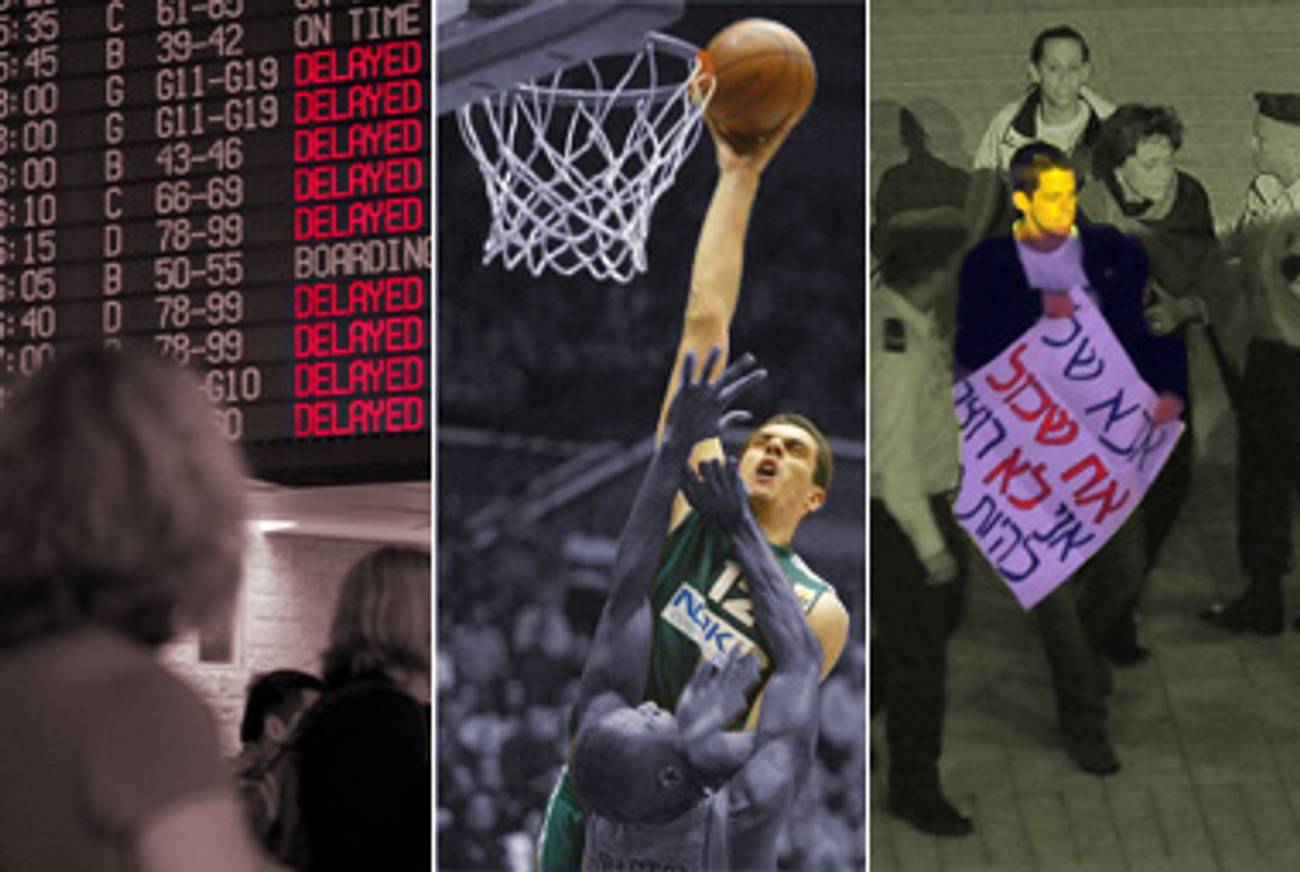Games
This week in Israel: Shalit’s family stages a different kind of protest, Mossad speculates on war with Iran, and Maccabi fans get stranded at the airport




Gilad Shalit’s brother disrupted the official state torch-lighting ceremony on the eve of Israel’s Independence Day this week to call for the release of the captive Israeli soldier, who was seized by Palestinian militants in June 2006. Shalit’s brother Yoel and Yoel’s girlfriend, Ya’ara Winkler, burst onto the plaza where the Jerusalem ceremony was being held and waved handwritten placards. Yoel’s read: “My father is an ah shakul [bereaved brother]. I don’t want to be one too!!!” The outburst, which led to the protesters’ ejection from the ceremony, was touted as the start of a “decisive phase” in the Shalit family’s battle against the state. Referring to Prime Minister Benjamin Netanyahu, Haaretz’s Gideon Levy thanked Yoel Shalit for announcing that the emperor has no clothes (hamelekh hu erom, literally “the king is naked”). Knesset Speaker Reuven Rivlin derided the protest as “damaging the just struggle (hama’avak hatzodek) for Shalit,” and veteran broadcast journalist Dan Margalit wrote—in a column that the Israel Hayom daily headlined “Davka Batekes Hazeh?” (Davka at This Ceremony?)—that he wasn’t so sure the event that formally marks the transition from day of mourning to day of celebration was really the right venue for the otherwise legitimate complaint. As Maariv put it in a headline, the family is “Kvar Lo Menumasim”—“Polite No Longer.”
Al Jazeera television reported on its website that Cairo has come up with a blueprint for Shalit’s release and that Hamas deems it acceptable. A few days later the London-based Al Hayat reported that Hamas was ready to renew negotiations with Israel, brokered by Egypt. Haaretz quoted Israeli defense officials as saying that while they welcome Egyptian involvement, reports of a breakthrough should be taken with a grain of salt, since such reports have proved false before. A high-level Israeli delegation is due in Cairo over the weekend to discuss the matter, Maariv said on its website, prompting one commenter to write that the trip should have been postponed by a few days so no one could argue that Yoel Shalit’s outburst might have been what set the process in motion.
An Israel Air Force attack on Iran’s nuclear facilities would be “a stupid thing” (“davar metupash”), former Mossad chief Meir Dagan said at a conference for senior civil servants held at the Hebrew University of Jerusalem this week. “The question of questions is what will happen afterward,” he said. “Afterward there will be a war with Iran. That’s the kind of thing where we know how it begins but not how it ends.” Yedioth Ahronoth reported that Dagan had made similar comments to journalists before but that they were banned from publication by the military censor. The Israeli media are legally obligated to get permission from the censor before publishing articles that could potentially damage national security—but there’s a catch, writes Ronen Bergman in Yedioth: There’s no problem as long as the person who makes the statement is the (former) Mossad chief rather than a journalist.
Takeoffs from Ben-Gurion International Airport have resumed since the discovery of contaminated fuel brought them to a halt last Thursday, but the crisis continued to delay outgoing flights throughout the week. Terrorism has been ruled out as a cause, and the airport is awaiting expert findings. The Israeli press gave a lot of play to the hundreds of stranded Maccabi Tel Aviv fans trying to get to Barcelona to watch their basketball team play in the Euroleague’s finals. Fans who stayed home had to face the prospect of missing the final moments of the game because even if it were to go into overtime, Israeli television stations were planning to end the broadcast by 7:45 p.m., 15 minutes before the siren (tzfira) signaling the onset of Memorial Day, Yedioth reported. As it happened, the Israeli team lost the championship to the Athens-based Panathinaikos and listened to the siren in the locker room, via a cell-phone link to Israel. In a way, that loss was a good thing, Yossi Sarid wrote half-seriously, since the “distressed fans returning from Barcelona would disembark from their planes with expressions reflecting their identification with the 22,867 bereaved families” of fallen soldiers.
Shoshana Kordova is an editor and translator at the English edition of Haaretz. She grew up in New Jersey and has been living in Israel since 2001.
Shoshana Kordova is an editor and translator at the English edition of Haaretz. She grew up in New Jersey and has been living in Israel since 2001.